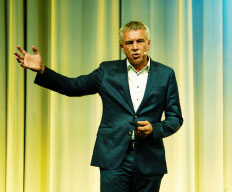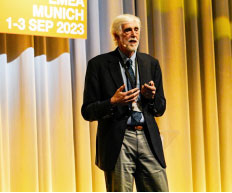In the December 2023 issue of Global Perspectives, we introduced a new, occasional feature of Global Perspectives, where we hear from some of the key people in HAE today to ask them what’s really happening.
We met Professor Marcus Maurer and Professor Bruce Zuraw during the 2023 HAEi Regional Conference EMEA. We asked them what impact they hope to have, what their hopes for the future are, and what barriers they see to further progress.
 We start with Professor Maurer.
We start with Professor Maurer.
What impact do you want your words to have on people with HAE, their caregivers, and fellow healthcare professionals?
I want my words to tell everyone that we have to address disparities. We have to go and help those patients who live in settings where improvements in care and treatment options are key.
Ultimately, we want people to forget they have HAE. We want them to think: ‘This is the party I will go to. This is the vacation I will take. This is the business trip I will be on.’ All without the looming fear that an attack at the wrong time may make all of this impossible. Complete control means the patient is in control. They are the boss of their life, not their disease.
They are the boss of their life, not their disease.
We hear a lot about the success of ACARE (Angioedema Centers of Reference and Excellence). Can you elaborate on how ACARE and accredited centers benefit people with HAE?
There are 32 criteria that centers need to complete to be in ACARE. One is that every center commits to patient and physician education and awareness raising.
As a result, ACAREs are contributing much more to patient education. The Middle East ACAREs in Oman, Abu Dhabi, and Kuwait are great examples. Because patients now know that expert care is close to them, they are coming forward. We have newly diagnosed entire families as a result.
Clinical trials are another vital way patients benefit from the ACARE accreditation process. Clinical trials offer modern treatments to patients who otherwise don’t have access to them. Within the ACARE criteria is the ability and desire to do clinical trials. These centers are basically ‘pre-vetted.’ We know they can do it, which means patients at these centers already have increased opportunities to get on a trial. We now need to get trials in new centers, as there are still many countries where there are currently no trials.
Every center coming on board pledges to use patient-reported outcome measures as routine tools for all of their patients. As a result, we see that quality of care improves and is more finely tuned. In contrast, without these tools, it’s difficult to say how well-controlled the disease is in individual patients and what the disease activity is.
As we reach the end of the year, what gives you a sense that there is a brighter future?
Thanks to the partnership between GA2LEN and HAEi, access to care will become available to many more patients. This includes expert care, expert tools, and modern treatments.
To make global improvements, we must look at a global patient population and work with ACAREs globally. Our partnership with HAEi means this is more possible than ever.
And is there one thing that concerns you?
Complacency. All of us know that we have to keep at it and let people know that this is a horrible disease. Never give up must be the mantra.
All of us know that we have to keep at it and let people know that this is a horrible disease. Never give up must be the mantra.
I want HAE to become like your middle name. It’s just part of you. But it doesn’t influence how you live your life.
What’s the one thing that stands in the way of that?
Lack of knowledge is one; the other is money. As you truly understand the disease and what the treatments do, it turns out that it is more expensive to ignore it and not treat it well than to treat it. It can be hard to get people who don’t understand the problem to grasp that.
 Next, we hear from Professor Bruce Zuraw.
Next, we hear from Professor Bruce Zuraw.
What impact do you hope to have on people with HAE, their caregivers, and fellow healthcare professionals?
I want people to have the tools to know what’s right for them and advocate for themselves. I want to help people to have agency. In other words, to take control of their disease and ensure they’re getting the right care.
How important is it for experts like yourself to reach out and educate patients and caregivers?
Mostly, what I can do is education: the ability to explain what HAE is, what the options are, and what the science suggests the future might hold.
I take education very seriously, as without it, the best medications in the world aren’t going to have their desired effects.
I take education very seriously, as without it, the best medications in the world aren’t going to have their desired effects. HAE is always a series of decisions. What do you do when this happens? How might you prevent it? How do you prepare? You have to have knowledge to do a good job of caring for yourself, especially when your doctor is not at your side.
You have to have knowledge to do a good job of caring for yourself, especially when your doctor is not at your side.
What do you learn from attending events like the 2023 HAEi Regional Conference EMEA?
I learn what’s on people’s minds and see the situation from a different perspective. Seeing the patients gather, hearing their stories, and wanting to help is a huge motivation. I want to continue, to push harder, and to achieve more.
What’s your one hope for the future?
My hope for the future is that every HAE patient around the world lives a normal life free from the fact that they were born with HAE. I want HAE to become like your middle name. It’s just part of you. But it doesn’t influence how you live your life.
I want HAE to become like your middle name. It’s just part of you. But it doesn’t influence how you live your life.
What’s the one thing that stands in the way of that?
Lack of knowledge is one; the other is money. As you truly understand the disease and what the treatments do, it turns out that it is more expensive to ignore it and not treat it well than to treat it. It can be hard to get people who don’t understand the problem to grasp that.










